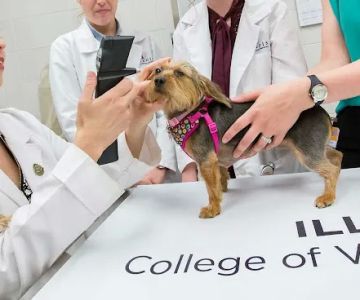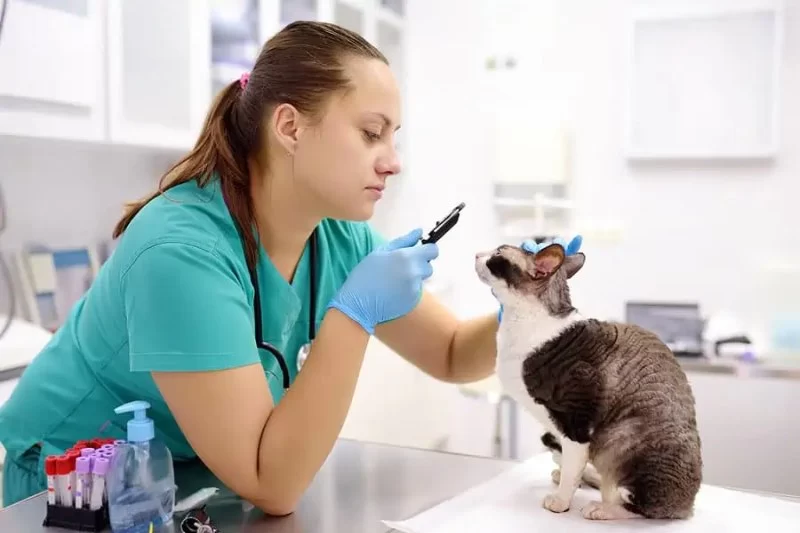What Does a Veterinary Nurse Do? A Complete Guide to Their Role and Responsibilities
- Introduction to Veterinary Nursing
- Daily Tasks of a Veterinary Nurse
- Importance of Veterinary Nurses in Animal Care
- Skills Required for a Veterinary Nurse
- How to Become a Veterinary Nurse
- Enhancing Your Career in Veterinary Nursing
- Where to Buy Veterinary Nursing Equipment
Veterinary nurses play a critical role in the health and well-being of animals, providing support to veterinarians and ensuring that pets and wildlife receive the care they need. From assisting with surgeries to providing aftercare, the work of a veterinary nurse is both rewarding and demanding. This article delves into what a veterinary nurse does, their responsibilities, and the essential skills required for the role. Whether you’re considering a career in veterinary nursing or are curious about what these professionals do, this guide will provide valuable insights.

1008 W Hazelwood Dr, Urbana, IL 61802, USA
See Details1. Introduction to Veterinary Nursing
Veterinary nurses are the unsung heroes of the animal care industry. They work closely with veterinarians and animal caretakers to provide medical treatment, monitor patient progress, and ensure that animals recover after surgery or illness. Veterinary nurses work in various settings, from private veterinary clinics to animal hospitals and wildlife care centers.
1.1 What Makes Veterinary Nursing Unique?
Unlike human nurses, veterinary nurses care for animals instead of people. This involves working with a variety of species, from domestic pets like cats and dogs to exotic animals like birds and reptiles. The role is dynamic and can range from performing medical tests to assisting with emergency care, making it an essential profession in the animal healthcare field.
2. Daily Tasks of a Veterinary Nurse
Veterinary nurses juggle a wide range of responsibilities throughout their day. Their duties may vary depending on the type of practice they work in, but the following tasks are common in most veterinary nursing roles:
2.1 Assisting with Procedures and Surgeries
Veterinary nurses assist veterinarians during surgeries and medical procedures. They prepare the operating room, sterilize instruments, and help monitor the patient’s vital signs during surgery. They may also prepare animals for anesthesia and assist with post-operative recovery.
2.2 Providing Medical Care and Monitoring
In addition to assisting with surgeries, veterinary nurses provide general medical care to animals. This includes administering medications, taking blood samples, and conducting diagnostic tests like X-rays. They also monitor the animal’s progress during recovery and make sure the treatment plan is followed effectively.
2.3 Educating Pet Owners
Veterinary nurses play an essential role in educating pet owners on how to care for their animals at home. They provide advice on administering medications, managing diet plans, and post-surgery care. Educating pet owners ensures the animals’ recovery is managed effectively outside the clinic.
3. Importance of Veterinary Nurses in Animal Care
Veterinary nurses are indispensable when it comes to the care and treatment of animals. They provide emotional and physical support, not only for the animals but also for pet owners. A veterinary nurse's role goes beyond just technical expertise – they bring compassion, care, and patience to every interaction, ensuring that both the animal and its owner feel supported throughout the treatment process.
3.1 Compassionate Care for Animals
Animals in pain or distress need reassurance, and veterinary nurses provide this care with kindness. They comfort animals in stressful situations and assist in their recovery by monitoring their condition and offering gentle handling. Their understanding of animal behavior allows them to provide exceptional care and reduce anxiety in the animals they treat.
3.2 Helping Pet Owners Feel at Ease
When a pet is sick or injured, it’s a stressful time for pet owners. Veterinary nurses help ease their worries by providing clear explanations of procedures, answering questions, and offering practical advice. Their supportive role helps to build trust between the pet owners and the veterinary team.
4. Skills Required for a Veterinary Nurse
Being a veterinary nurse requires a combination of technical skills, physical stamina, and emotional intelligence. Here are some of the essential skills needed for this role:
4.1 Medical and Technical Knowledge
A veterinary nurse must have a strong understanding of animal anatomy, physiology, and medical procedures. They must be skilled in using medical equipment, administering injections, taking blood samples, and performing diagnostic tests. A deep knowledge of pharmacology and the ability to understand complex medical terminology is also crucial.
4.2 Communication Skills
Clear communication is essential when interacting with pet owners and the veterinary team. Veterinary nurses must be able to explain medical procedures, advise on care, and offer emotional support when necessary. They also need to communicate effectively with other veterinary professionals to ensure the best possible care for animals.
4.3 Physical Stamina and Dexterity
Veterinary nurses must be physically fit and able to perform tasks that require stamina and strength. Whether it’s lifting animals, standing for long periods, or assisting with surgeries, the role demands physical endurance and quick thinking. Fine motor skills are also essential for tasks like taking blood samples or suturing wounds.
5. How to Become a Veterinary Nurse
Becoming a veterinary nurse typically requires a combination of education, practical experience, and certification. Here’s a breakdown of the steps involved:
5.1 Obtain the Necessary Education
Many veterinary nurses begin by earning a degree or diploma in veterinary nursing. In the U.S., this typically involves completing a two- or four-year veterinary nursing program that covers animal care, medical procedures, and clinical practice.
5.2 Gain Practical Experience
In addition to classroom learning, aspiring veterinary nurses must complete hands-on training in veterinary clinics. This provides real-world experience in assisting with surgeries, administering treatments, and interacting with animals and their owners.
5.3 Certification and Licensing
In many areas, veterinary nurses are required to obtain certification or licensure to practice. Certification exams often include both written and practical components to assess knowledge and skill. Licensing requirements vary by state, so it’s important to research local regulations before beginning your career.
6. Enhancing Your Career in Veterinary Nursing
Veterinary nurses can enhance their careers by specializing in specific fields, such as emergency care, surgery, or dentistry. Continuing education and advanced certifications allow veterinary nurses to take on more responsibility and increase their earning potential. Networking with other professionals and attending industry conferences can also provide valuable opportunities for career growth.
7. Where to Buy Veterinary Nursing Equipment
Having the right tools is essential for a veterinary nurse to perform their job efficiently. From surgical instruments to diagnostic tools, it’s important to use high-quality equipment to ensure optimal care. Visit Pine Cliff Resort for all your veterinary nursing needs, offering top-of-the-line equipment designed to help you perform at your best. Whether you’re looking for medical supplies, grooming tools, or pet care products, we have you covered.
Start your journey to becoming an expert in veterinary care and enhance your practice with professional-grade equipment from Pine Cliff Resort.











